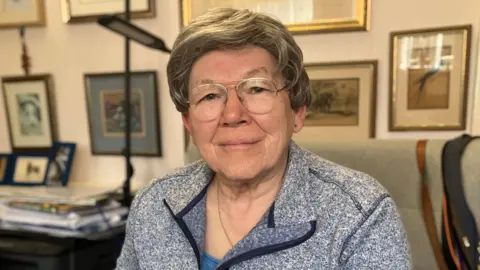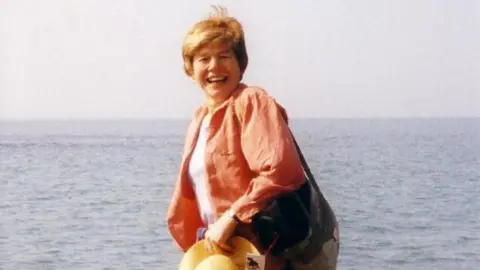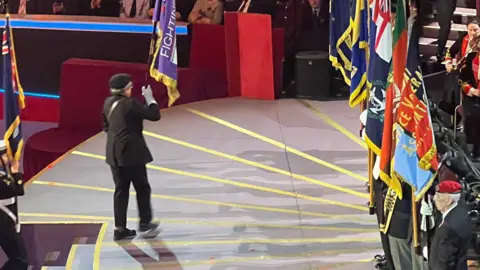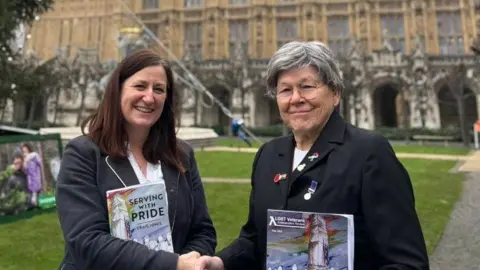'The Army's gay ban led to my mental breakdown'
 BBC
BBCClaire Ashton felt different to other soldiers in the Royal Artillery.
She had joined the army in 1969 and was deployed to Germany during the Cold War and later to Northern Ireland at the start of The Troubles.
At the time it was illegal to be gay in the armed forces, something Ms Ashton was not, she was in fact transgender.
"They thought I was gay but trans hadn't crossed their radar all those years ago," said Ms Ashton, who lives in Uffington, Shropshire.
She was a good soldier and a talented surveyor but her skills could not stop the bullying and harassment.
She faced constant speculation and inappropriate questioning, and the pressure of hiding her identity became so overbearing that she had a mental breakdown while on deployment in Germany in 1972 and was medically discharged by the army.
"One of the main pressures was being so close to other people in the unit all the time.
"When I went to Northern Ireland, we were on a ship in Belfast harbour called HMS Maidstone and the bunks were about four high. I found that a tremendous pressure.
"People who were discharged were discovered by private letters which had been sent between friends.
"People had put down their hopes and dreams in letter and this is what brought them down.
"Rooms would be stripped bare looking for evidence", she added.
 Claire Ashton
Claire AshtonThe so-called gay ban, which made it illegal to be homosexual in the armed forces, was lifted by the UK government in January 2000 following a hearing in the European Court of Human Rights.
Some of those caught faced prison sentences of up to two years.
The LGBT+ military charity Fighting With Pride estimated that between 2,000 and 5,000 people were impacted by the ban.
In 2022, the Ministry of Defence commissioned Britain's first openly gay judge, Lord Etherton, to carry out an independent review into the treatment of LGBT personnel between 1967 and 2000.
It made 49 recommendations, including an official apology by the prime minister and individual apologies from the heads of the armed forces.
The government has subsequently implemented 38 of the 49 recommendations.
On publication of the review in July 2023, the then Prime Minister Rishi Sunak apologised on behalf of the country to veterans who were affected by the policy.
The review also recommended that those dismissed from the armed forces because of the ban should be eligible for up to £70,000 in compensation.
Applications opened in December.
 Claire Ashton
Claire Ashton"Whether I'm due recognition payments, I don't know, but I have applied," said Ms Ashton.
"We've been told there's an 18 week wait.
"What will never be compensated for is the hurt and distress caused to people, some who were interrogated for hours on end without food and water.
"I know of people who'd gone to chaplains to speak with them confidentially and the chaplains passed on the information, which is appalling, but they were instructed to do so."
In 2023, Ms Ashton was chosen by Fighting With Pride to carry the charity's flag during the Festival of Remembrance at the Royal Albert Hall in front of the King and Queen.
"There wasn't a prouder veteran that day," said Ms Ashton.
 Julia Buckley MP
Julia Buckley MPIn December, Ms Ashton was invited to Westminster by Labour's Shrewsbury MP Julia Buckley to watch a parliamentary debate on the Etherton Review.
Buckley told Ms Ashton's story to the House of Commons, describing her as a "brave and committed soldier" who, after being medically discharged, "disappeared back up north into obscurity... never having been thanked" for her service.
Ms Ashton, who was sat in the Commons' public gallery, said the debate was the recognition that affected veterans had been fighting for.
The Ministry of Defence said it now actively encourages LGBT+ people to join the armed forces and had policies to prevent discrimination and bullying.
Follow BBC Shropshire on BBC Sounds, Facebook, X and Instagram.
